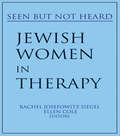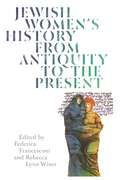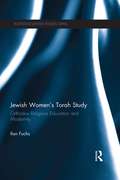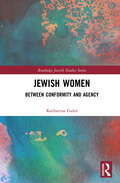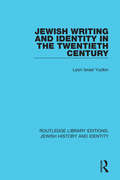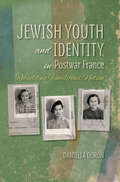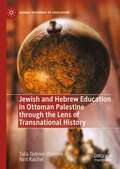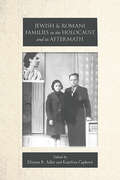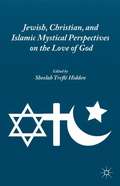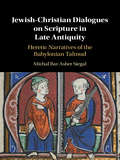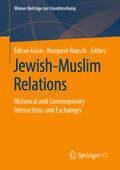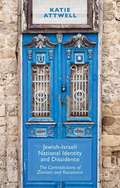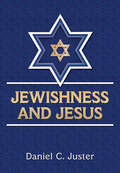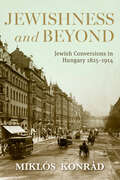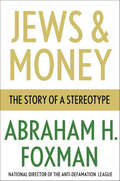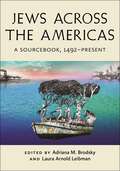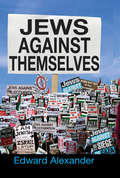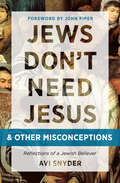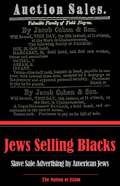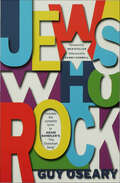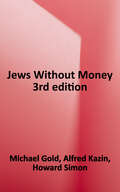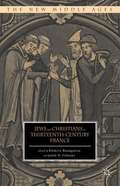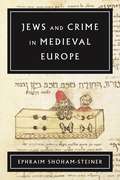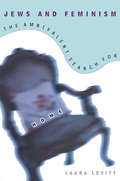- Table View
- List View
Jewish Women in Therapy: Seen But Not Heard
by Ellen Cole Rachel J SiegelHere is the first volume ever to focus on the issues of Jewish women in the context of counseling and psychotherapy. Through poignant reflection and observation, the authors convey the richness and variety of Jewish women’s experiences and the Jewishness and femaleness of the concerns, issues, values, and attitudes that Jewish women--both clients and therapists--bring into the therapy room.Jewish Women in Therapy is a landmark book in many ways. It calls attention to the historical and political realities of the Jewish heritage and acknowledges the oppression of both Jews and women that therapists have typically ignored. And although Jewish women have participated in the therapeutic process, as clients, scholars, and therapists, seldom have they chosen to write about it.Never before have the writings of so many distinguished leaders in the field, including Melanie Kaye/Kantrowitz, Evelyn Torton Beck, and Susannah Heschel, been compiled. They examine the damaging stereotypes of Jewish women--the Jewish American Princess and the Jewish Mother--that flourish today. Chapters also address the conflicts that many women feel about being Jewish and being female, celebrate the contributions of Jewish women to feminism and to therapy, examine the deliberate omission of women from the political process and the religious ritual, and convey the complexities of the oppression that are still blatantly directed at both Jews and females.
Jewish Women's History from Antiquity to the Present
by Debra Kaplan Elisheva Carlebach Nadia Valman Judith R. Baskin Dianne Ashton Moshe Rosman Marla Brettschneider Dina Danon Rebecca Lynn Winer Natalia Aleksiun Rachel Adelman Benjamin M. Baader Joseph and Esther Foster Professor in Judaic Studies Sylvia Barack Fishman Book Review Editor Federica Francesconi ChaeRan Freeze Tal Ilan Book Review Editor Melissa R Klapper Sharon Koren Frances Malino Renee Levine Melammed Lilach Rosenberg-FriedmanJewish Women’s History from Antiquity to the Present is broad in geographical scope exploring Jewish women’s lives in what is now Eastern and Western Europe, Britain, Israel, Turkey, North Africa, and North America. Editors Federica Francesconi and Rebecca Lynn Winer focus the volume on reconstructing the experiences of ordinary women and situating those of the extraordinary and famous within the gender systems of their times and places. The twenty-one contributors analyze the history of Jewish women in the light of gender as religious, cultural, and social construct. They apply new methodologies in approaching rabbinic sources, prescriptive literature, and musar (ethics), interrogating them about female roles in the biblical and rabbinic imaginations, and in relation to women’s restrictions and quotidian actions on the ground. They explore Jewish’s women experiences of persecution, displacement, immigration, integration, and social mobility from the medieval age through the nineteenth century. And for the modern era, this volume assesses women’s spiritual developments; how they experienced changes in religious and political societies, both Jewish and non-Jewish; the history of women in the Holocaust, their struggle through persecution and deportation; women’s everyday concerns, Jewish lesbian activism, and the spiritual sphere in the contemporary era. Contributors reinterpret rabbinical responsa through new lenses and study a plethora of unpublished and previously unknown archival sources, such as community ordinances and court records, alongside autobiographies, letters, poetry, narrative prose, devotional objects, the built environment, illuminated manuscripts, and early printed books. This publication is significant within the field of Jewish studies and beyond; the essays include comparative material and have the potential to reach scholarly audiences in many related fields but are also written to be accessible to all, with the introductions in every chapter aimed at orienting the enthusiast from outside academia to each time and place.
Jewish Women's Torah Study: Orthodox Religious Education and Modernity (Routledge Jewish Studies Series)
by Ilan FuchsOne of the cornerstones of the religious Jewish experience in all its variations is Torah study, and this learning is considered a central criterion for leadership. Jewish Women’s Torah Study addresses the question of women's integration in the halachic-religious system at this pivotal intersection. The contemporary debate regarding women’s Torah study first emerged in the second half of the 19th century. As women’s status in general society changed, offering increased legal rights and opportunities for education, a debate on the need to change women’s participation in Torah study emerged. Orthodoxy was faced with the question: which parts, if any, of modernity should be integrated into Halacha? Exemplifying the entire array of Orthodox responses to modernity, this book is a valuable addition to the scholarship of Judaism in the modern era and will be of interest to students and scholars of Religion, Gender Studies and Jewish Studies.
Jewish Women: Between Conformity and Agency (Routledge Jewish Studies Series)
by Katharina GalorJewish Women: Between Conformity and Agency examines the concepts of gender and sexuality through the primary lens of visual and material culture from antiquity through to the present day. The backbone of this transhistorical and transcontextual study is the question of Jewish women’s agency in four different geographical, chronological, and methodological contexts, beginning with women’s dress codes in Roman-Byzantine Syro-Palestine, continuing with rituals of purity in medieval Ashkenaz, worship in papal Avignon and the Comtat Venaissin, and ending with marriage and divorce in Israeli film. Each of these explorations is interested in creating a dialogue between the patriarchal legacy of the traditional texts and the chronologically corresponding visual and material culture. The author challenges traditional approaches to the study of Jewish culture by employing tools from art history, archaeology, and film and media studies. In each of these different contexts, there is ample evidence that women—despite persistent overall structural discrimination—have found ways to challenge male constructs of gender norms. Ultimately, these examples from past and present times highlight women’s eminence in shaping Jewish history and culture. Bringing a new interdisciplinary lens to the study of the history of gender and sexuality, the book will be of interest to students and researchers of Jewish history and culture, art history, archaeology, and film studies.
Jewish Writing and Identity in the Twentieth Century (Routledge Library Editions: Jewish History and Identity)
by Leon Israel YudkinFrom the 1880s, when systematic pogroms in Russia led to massive emigration, there have been two themes in Jewish history - persecution, culminating in the holocaust, and the corresponding search for a place in the world, which led to emigration to America, the rise of Zionism and the emergence of the State of Israel. In spite of these factors, Jews throughout the world have maintained their sense of identity and their cohesion as a people. One factor which has enabled them to do this has been the formation of an ideological vision of themselves - a sense of Jewishness - and one major way in which this ideology expresses itself is through the contributions by Jews to literature and thought. This book, originally published in 1982 by an established authority on Hebrew and Israeli literature, analyses the characteristics of the Jewish sense of identity as it appears in twentieth-century Jewish literature. It considers the work of a variety of authors who wrote in different periods and countries, and shows how their Jewish background pervades their writing. Some of the authors discussed are Franz Kafka, Osip Mandelstam, Henry Roth, Giorgio Bassani, S.Y. Agnon, Saul Bellow and Norman Mailer. This book will be particularly useful since a complete understanding of the Jews in the twentieth century can only be gained by appreciating their literary and intellectual achievements.
Jewish Youth and Identity in Postwar France: Rebuilding Family and Nation (The Modern Jewish Experience)
by Daniella Doron“Highlights the debates surrounding family and identity as French Jewish communities slowly recovered and reestablished their place in the French nation.” —ChoiceAt the end of World War II, French Jews faced a devastating demographic reality: thousands of orphaned children, large numbers of single-parent households, and families in emotional and financial distress. Daniella Doron suggests that after years of occupation and collaboration, French Jews and non-Jews held contrary opinions about the future of the nation and the institution of the family. At the center of the disagreement was what was to become of the children. Doron traces emerging notions about the postwar family and its role in strengthening Jewish ethnicity and French republicanism in the shadow of Vichy and the Holocaust.“Doron’s book appears at a key moment. Its emphasis on children emerging from hunger, displacement and war should render it standard reading for policymakers, NGOs and others interested in shaping the destinies of today’s abandoned children.” —French History“Raises fundamental questions for the understanding of not only Jewish reconstruction in post-World War II France, but also Holocaust memory, postwar French society and culture and the history of postwar European families and children.” —French Politics, Culture and Society“Doron’s deftly argued and well researched book is an important intervention into a growing body of scholarship on the postwar decade. She convincingly documents the central role that the rehabilitation of Jewish children and the reconstruction of Jewish families played in post-war French Jewish reconstruction and underscores the importance of the decade following the war in shaping Jewish historical evolution in France.” —Maud Mandel, author of Muslims and Jews in France
Jewish and Hebrew Education in Ottoman Palestine through the Lens of Transnational History (Global Histories of Education)
by Nirit Raichel Talia Tadmor-ShimonyThis book uses transnational history to explain the formation of modern schools in a territory that lacks modern education. The emergence of modern Jewish education in Ottoman Palestine resulted from European actors and networks' infiltration of educational concepts due to several unique elements. One of them was the activity of transnational networks and actors. The other factor is the important place of education in shaping reality in the Jewish and Hebrew discourse. The area of Ottoman Palestine was almost devoid of modern education, so it is possible to examine the ways of transferring educational concepts. Historians can diagnose the starting point and locate the actors’ biographies and journeys. The book discusses and discovers several themes, such as molding five portraits of modern Jewish and Hebrew education graduates and the function of the school as a medical site due to the shortage of public health policy.
Jewish and Romani Families in the Holocaust and its Aftermath
by Eliyana R. Adler Dalia Ofer Sarah Wobick-Segev Laura Hobson Faure Natalia Aleksiun Viktoria Banyai Robin Judd Anja Reuss Helena Sadílková Joachim Schlör Michal Unger Katerina Capková Volha BartashDiaries, testimonies and memoirs of the Holocaust often include at least as much on the family as on the individual. Victims of the Nazi regime experienced oppression and made decisions embedded within families. Even after the war, sole survivors often described their losses and rebuilt their lives with a distinct focus on family. Yet this perspective is lacking in academic analyses. In this work, scholars from the United States, Israel, and across Europe bring a variety of backgrounds and disciplines to their study of the Holocaust and its aftermath from the family perspective. Drawing on research from Belarus to Great Britain, and examining both Jewish and Romani families, they demonstrate the importance of recognizing how people continued to function within family units—broadly defined—throughout the war and afterward.
Jewish, Christian, And Islamic Mystical Perspectives On The Love Of God
by Sheelah Treflé HiddenThe resurgence of mysticism in the religions in the last few decades undoubtedly stems from a widespread need for a deeper, more contemplative spirituality. Jewish, Christian and Islamic Mystical Perspectives on the Love of God, explores what Jews, Christians, and Muslims can learn from their own faith, from the experience of a dialogue that seeks, at its best, to face them with something new, strange, and unexpected. The book bears witness, by means of the great spiritual thinkers of the three traditions, to what becomes possible when friendship and integrity are allowed to flourish.
Jewish-Christian Dialogues on Scripture in Late Antiquity: Heretic Narratives of the Babylonian Talmud
by Michal Bar-Asher SiegalStories portraying heretics ('minim') in rabbinic literature are a central site of rabbinic engagement with the 'other'. These stories typically involve a conflict over the interpretation of a biblical verse in which the rabbinic figure emerges victorious in the face of a challenge presented by the heretic. In this book, Michal Bar-Asher Siegal focuses on heretic narratives of the Babylonian Talmud that share a common literary structure, strong polemical language and the formula, 'Fool, look to the end of the verse'. She marshals previously untapped Christian materials to arrive at new interpretations of familiar texts and illuminate the complex relationship between Jews and Christians in Late Antiquity. Bar-Asher Siegal argues that these Talmudic literary creations must be seen as part of a boundary-creating discourse that clearly distinguishes the rabbinic position from that of contemporaneous Christians and adds to a growing understanding of the rabbinic authors' familiarity with Christian traditions.
Jewish-Muslim Relations: Historical and Contemporary Interactions and Exchanges (Wiener Beiträge zur Islamforschung)
by Ednan Aslan Margaret RauschThis multidisciplinary volume unites research on diverse aspects of Jewish-Muslim relations, exchanges and coexistence across time including the Abrahamic tradition enigma, Jews in the Qur’an and Hadith, Ibn al-‘Arabi and the Kabala, comparative feminist theology, Jews, Christians, Muslims and the Gospel of Barnabas, harmonizing religion and philosophy in Andalusia, Jews and Muslims in medieval Christian Spain, Israeli Jews and Muslim and Christian Arabs, Jewish-Muslim coexistence on Cyprus, Muslim-Jewish dialogues in Berlin and Barcelona, Jewish-Christian-Muslim trialogues and teleology, Jewish and Muslim dietary laws, and Jewish and Muslim integration in Switzerland and Germany.
Jewish-israeli National Identity And Dissidence
by Katie AttwellThis unique book provides a critical perspective on identity in questioning how Israeli Jews manage and manifest their concern for the Palestinian Other, eschewing presenting identities as concrete and, rather, examines their creation through discourse. Zionism and the Israeli state have constructed a Jewish national identity premised on demonisation of the Other. This book explores how internal critics use alternative discourses of identity to re-imagine this Jewish-Israeli national identity, and considers how they might fail. It combines a rigorous theoretical analysis of nationalism with an engaging examination of the identifications and contradictions of eleven Jewish-Israeli individuals. Featuring, among others, high profile journalist Gideon Levy, veteran maverick Uri Davis and literary novelist Dorit Rabinyan, Attwell provides a revealing insight into national identity, political dissent, conflict and resistance.
Jewishness & Jesus
by Daniel Juster, Th.D.This little booklet has been one of the more used booklets presenting the Good News in a Jewish context. It has sold hundreds of thousands of copies and has had consistently good reviews. The essence is to present Yeshua (Jesus) in his Jewish context and to show how following him is consistent with being Jewish. It also presents the development of the synagogue-church split and why this has made true understanding difficult.
Jewishness and Beyond: Jewish Conversions in Hungary 1825–1914 (Studies in Hungarian History)
by Miklós KonrádThroughout the nineteenth century, Hungary's government steadily dismantled obstacles that kept its rapidly expanding Jewish communities from enjoying the full benefits of citizenship. The state's concerted efforts to "Magyarize" Jews promoted Hungarian language, culture, and sensibilities, but did not officially require Jews to abandon their faith. Nevertheless, tens of thousands of Hungarian Jews converted to Christianity during this era, with conversion rates continuing to rise even as Judaism gained full legal equality.Jewishness and Beyond addresses the apparent contradiction between these two trends. Despite the egalitarian promises and laws of Hungary's liberal nationalist government, the administration and traditional elites as a whole maintained a persistent bias against Jews that spurred particularly high conversion rates among the community's upper echelons. While Christians never forgot converted Jews' origins and increasingly thought of them in racialized terms, they also valued and generally rewarded conversion and the symbolic gesture of baptism. Conversion was an uneven and ever-shifting process in which gender and occupation played key roles, and where the actual percentage of converts within the total Hungarian Jewish population contrasted sharply with both Christian and Jewish perceptions of its frequency and spread.Jewishness and Beyond, which can be read as an introduction to the identity dilemmas of Hungarian Jews in the age of emancipation, reveals the motivations and strategies behind the conversions of Hungarian Jews, the complex reactions within and outside of their communities, and converts' own grappling with conversion's expected and unforeseen outcomes.
Jews & Money: The Story of a Stereotype
by Abraham H. FoxmanIn the wake of Bernie Madoff's ruinous investment schemes, Abe Foxman takes a cultural and political look at the many variations throughout history of the assumptions made about Jews and money. These include Jews as greedy global capitalists; Jews as wealthy secret communists; Jews as cheapskates; and Jews controlling the media with their money to unduly influence society. Foxman makes the case that these stereotypes have permeated cultures globally and argues that these beliefs are rooted in deep-seated and pervasive anti-Semitism. As with all forms of bigotry, society at large needs to respond to the persistence of stereotypes by educating the young, denouncing hate speech, and by encouraging Jews, like all groups, to express pride in their ethnic and religious heritage.
Jews Across the Americas: A Sourcebook, 1492–Present (Goldstein-Goren Series in American Jewish History)
by Adriana M. Brodsky and Laura Arnold LeibmanAn overview of the history of American Jewry using primary sources from Latin America, theCaribbean, Canada, and the United StatesJews Across the Americas is a groundbreaking sourcebook capturing the historical diversity and culturalbreadth of American Jews across Latin America, the Caribbean, Canada, and the United States. Featuringprimary documents as well as scholarly interpretations, Jews Across the Americas builds upon newdevelopments in Jewish Studies, engaging with transnationalism, race, sexuality, and gender, andhighlighting the lived experiences of those often left out of Jewish history.Jews Across the Americas features an impressively broad and far-reaching range of historical sources,including artifacts and objects that have not previously been featured as integral to Jewish history in theWestern hemisphere. Entries teach readers how to understand everything from wills andadvertisements to sermons, and how to interpret photographs, domestic architecture, and comics.Whether it’s a recipe from Brazil that blends Moroccan and Amazonian foodways, or a text about thefirst non-binary Jew to cross the Atlantic in the eighteenth century, each entry broadens ourunderstanding of Jewish American history.
Jews Against Themselves
by Edward AlexanderThis volume features powerful essays by Edward Alexander on the phenomenon of anti-Zionism on the part of the Jewish intelligentsia. It also analyses the explosive growth of traditional anti-Semitism, especially in Europe, among intellectuals and Muslims. Alexander notes that anti-Zionism has established a presence even in Israel, where it frequently takes the form of intellectuals sympathizing with their country's enemies and perversely apologizing for their own existence.Alexander begins with an examination of the origins of Jewish self-hatred in nineteenth-century Europe. He then explores the mindset of disaffected Jews in reacting, or failing to react, to the two events that shape modern Jewry: the Holocaust and the founding of the State of Israel.The book concludes with a focus on contemporary anti-Zionism, including three essays about the role played by Jews in the Boycott, Divestment, and Sanctions Movement to expel Israel from the family of nations. A final essay addresses the need for American Jews to decide whether they are going to judge Judaism by the standards of The New York Times or The New York Times by the standards of Judaism.
Jews Don't Need Jesus. . .and other Misconceptions: Reflections of a Jewish Believer
by Avi SnyderA debate that's 2,000 years old, and running… Do Jews need Jesus? It&’s an age-old debate with eternal ramifications. If Jesus is not the Jewish Messiah, if He is not the savior of the world, if He is not the promised redeemer God sent to restore Israel and redeem the nations (Isaiah 49:6), then bringing His message to the Jewish people is a grave threat to their security. But if He is the prophet God promised to raise up, if God did indeed command Israel to follow Him, and if the Jews will be held accountable by God if they don&’t accept Jesus, then sharing His message is beyond imperative. Jesus is either &“Lord of all or not Lord at all.&” The stakes couldn&’t be higher. Jews Don&’t Need Jesus… and Other Misconceptions settles this dispute with biblical evidence. It argues that believing in Jesus isn&’t apostasy; it&’s obedience, and it leads to eternal blessing. That&’s what makes this book critical for Jewish people or anyone in gospel ministry to the Jews.
Jews Don't Need Jesus. . .and other Misconceptions: Reflections of a Jewish Believer
by Avi SnyderA debate that's 2,000 years old, and running… Do Jews need Jesus? It&’s an age-old debate with eternal ramifications. If Jesus is not the Jewish Messiah, if He is not the savior of the world, if He is not the promised redeemer God sent to restore Israel and redeem the nations (Isaiah 49:6), then bringing His message to the Jewish people is a grave threat to their security. But if He is the prophet God promised to raise up, if God did indeed command Israel to follow Him, and if the Jews will be held accountable by God if they don&’t accept Jesus, then sharing His message is beyond imperative. Jesus is either &“Lord of all or not Lord at all.&” The stakes couldn&’t be higher. Jews Don&’t Need Jesus… and Other Misconceptions settles this dispute with biblical evidence. It argues that believing in Jesus isn&’t apostasy; it&’s obedience, and it leads to eternal blessing. That&’s what makes this book critical for Jewish people or anyone in gospel ministry to the Jews.
Jews Selling Blacks: Slave Sale Advertising by American Jews
by Nation Of IslamThere are 140 pages of ads reproduced from American newspapers of the slavery era. There are Jews selling Blacks as individuals, in gangs, and as families. Jewish community leaders--and even rabbis--offer to buy and sell Black human beings without any moral compunction. When Blacks tried to escape, Jewish slave owners used the newspapers to track them down. Jews acting as slave auctioneers, slave shippers, and insurers of enslaved Blacks also placed ads. Jews bought and sold whole plantations--slaves and all--and they marketed slaves who ranged in age from infants to the elderly. In addition, Jewish merchants arranged bank financing for the purchasers of Black men, women, and children--Black slaves on layaway.
Jews Who Rock
by Guy OsearyForeword by Ben StillerAfterword by Perry FarrellJewish achievement in the sciences? Celebrated. Jews in literature? Lionized. But until now, there's been no record of the massive contributions of Jews in Rock n' Roll. Jews Who Rock features 100 top Jewish rockers, from Bob Dylan to Adam Horowitz, Courtney Love (yes, she's half Jewish) to John Zorn, with a concise page of essential data and a biography of each one.Includes the complete lyrics to "The Chanukah Song" by Adam Sandler
Jews Without Money
by Michael GoldAs a writer and political activist in early-twentieth-century America, Michael Gold was an important presence on the American cultural scene for more than three decades. Beginning in the 1920s his was a powerful journalistic voice for social change and human rights, and Jews Without Money—the author's only novel—is a passionate record of the times. <p><p>First published in 1930, this fictionalized autobiography offered an unusually candid look at the thieves, gangsters, and ordinary citizens who struggled against brutal odds in lower East Side Manhattan. Like Henry Roth's Call It Sleep and Abraham Cahan's The Rise and Fall of David Levinsky, Jews Without Money is a literary landmark of the Jewish experience. <p><p>Michael Gold (1893-1967) was born in New York City, where later he wrote for radical journals and newspapers such as New Masses and The Liberator. Jews Without Money has been translated in more than fourteen countries, including Germany, where the novel was employed against Nazi propaganda.
Jews and Christians in Thirteenth-Century France
by Elisheva Baumgarten Judah D. GalinskyIn light of the growing tendency to view both religious communities as intimately linked, this work seeks to examine a variety of perspectives on Jewish and Christian life in northern France during the thirteenth-century. Contributors investigate the social and cultural changes which took place in European medieval society through legal developments, religious polemic, gender, social history, perceptions of the 'other,' language, literature and art. A secondary, but no less important goal,of this collection is to break down the artificial boundaries that divide the various academic disciplines and those that separate 'medieval studies' from 'Jewish studies'.
Jews and Crime in Medieval Europe
by Ephraim Shoham-SteinerJews and Crime in Medieval Europe is a topic laced by prejudice on one hand and apologetics on the other. Beginning in the Middle Ages, Jews were often portrayed as criminals driven by greed. While these accusations were, for the most part, unfounded, in other cases criminal accusations against Jews were not altogether baseless. Drawing on a variety of legal, liturgical, literary, and archival sources, Ephraim Shoham-Steiner examines the reasons for the involvement in crime, the social profile of Jews who performed crimes, and the ways and mechanisms employed by the legal and communal body to deal with Jewish criminals and with crimes committed by Jews. A society’s attitude toward individuals identified as criminals—by others or themselves—can serve as a window into that society’s mores and provide insight into how transgressors understood themselves and society’s attitudes toward them. The book is divided into three main sections. In the first section, Shoham-Steiner examines theft and crimes of a financial nature. In the second section, he discusses physical violence and murder, most importantly among Jews but also incidents when Jews attacked others and cases in which Jews asked non-Jews to commit violence against fellow Jews. In the third section, Shoham-Steiner approaches the role of women in crime and explores the gender differences, surveying the nature of the crimes involving women both as perpetrators and as victims, as well as the reaction to their involvement in criminal activities among medieval European Jews. While the study of crime and social attitudes toward criminals is firmly established in the social sciences, the history of crime and of social attitudes toward crime and criminals is relatively new, especially in the field of medieval studies and all the more so in medieval Jewish studies. Jews and Crime in Medieval Europe blazes a new path for unearthing daily life history from extremely recalcitrant sources. The intended readership goes beyond scholars and students of medieval Jewish studies, medieval European history, and crime in pre-modern society.
Jews and Feminism: The Ambivalent Search for Home
by Laura LevittBy interrogating America's promise of a home for Jews as citizens of the liberal state, Jews and Feminism questions the very terms of this social "contract". Maintaining that Jews, women, and Jewish women are not necessarily secure within this construction of the state, Laura Levitt links this contractual construction of belonging and acceptance to legacies of marriage as a contractual home for Jewish women. Exploring the immigration of Jews from Eastern Europe for America, as well as their desire to make this country their permanent home, Levitt raises questions about the search for stability in specific Jewish religious and cultural traditions which is linked to the liberal academy as well as feminist study, thus offering an account of an ambivalent Jewish feminist embrace of America as home.
